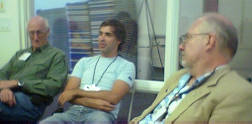Science Foo

Left to right: Stewart Brand of the Long Now Foundation, Google co-founder Larry Page, and SF writer Greg Bear at Rob's brainstorming sessionYes, it's officially true: my life rocks!
I spent this past weekend (August 11-13, 2006) at the Googleplex, the headquarters of Google, in Mountain View, California. I was a participant at Science Foo Camp, an invitation-only gathering produced by Nature (the international multidisciplinary science journal) and O'Reilly Media, the famed publisher of computer books. (FOO in this context stands for "Friends of O'Reilly.)
A hundred of us were invited to attend. The purpose: "to encourage cross-fertilization of ideas -- and to have fun."
The invitees were (according to the invitation) "a fascinating crowd of world-class biologists, chemists, physicists, earth scientists, clinicians, historians, technologists, and writers." I was honoured to be one of four science-fiction writers participating (the others were Greg Bear, Cory Doctorow, and Vernor Vinge).
When we arrived, we were shown a big grid with room names and their capacities written across the top, and hour-long timeslots down the left side. We were invited to grab a square and write in a description of a topic we wanted to discuss.
I decided to pick a modest-sized room that putatively held eight people (the smallest held four; the largest, 125), and invited those who wished to join me to come talk about the possibility of the World Wide Web gaining consciousness once it reaches a sufficient level of complexity -- which, as I explained, is the theme of a trilogy I'm now working on.
To give you a sense of the caliber of people at Science Foo Camp, among the overflow group that came to my room were Google co-founder Larry Page, Stewart Brand from the Long Now Foundation, futurist Esther Dyson, Sun Microsystems chief researcher John Gage, and my buddy Greg Bear.
The feedback was amazing: high-level, brilliant, and very, very useful. And I was very encouraged by how warmly my ideas were received.
And that was just one session! I also attended great sessions on robots based on insect designs, the future of human evolution (led by Greg Bear), collaborative web tools for health sciences, geobrowsers, the visual representation of data (presented by fellow Torontonian Michael Friendly of York University), Vernor Vinge on semiconductors as a potential single point of failure for civilization, a great talk about Project Orion presented by George Dyson, and a very lively discussion on science and religion.
Google put us all up at a very nice hotel (the Wild Palms in Sunnyvale) and provided shuttle service back and forth. And Google's legendary food-services people just kept feeding us!
Conversations over the 90-minute breakfast, lunch, and dinner breaks were fascinating. I enjoyed getting to meet nanotech pioneer K. Eric Drexler, Clinton Science Advisor Tom Kalil, Tom Knight from MIT's artificial intelligence lab, and many others.
Tim O'Reilly (the CEO of O'Reilly) and Timo Hannay from Nature were wonderful hosts, and the event fully succeeded at meeting its stated goal of being "an informal but intense eye-opening weekend." I loved every minute of it.



8 Comments:
Wow! That sounds great, Rob. Your trilogy sounds fascinating. I'll definitely pick it up when it comes out.
Best,
James Palmer
Hi, Jose. The ideas will be in my next book. :)
Hey Rob
That sounds like an awesome event. Kind of interesting what with Rob in Google land and Bill Gates in Toronto. Hmm...
Anyway, I was wondering Rob if you have every done a study on Nonlocality? Not quantum mechanics but NL of mind. Was it Aristotle? Or one of the other ancient philosophers of the day were really into this stuff. I read a bit about NL and it's fascinating material but too deep for my limited attention span :-)
I remember reading somewhere on your website about the internet gaining consciousness, and I think it's a fantastic idea. I tried to figure out how many computers are connected to the internet compared to how many neurons are in various animals brains, but didn't get very far with it. I would guess if it did become conscious, there's no reason to think it would know what it was, how to communicate with us, or even that we are here to be communicated with. Then again, I'm sure you have some way to get around that.
Your life SO rocks!
Just reading some of the topics discussed made my mind expand! I would have loved to be a fly on the wall in some of those rooms.
I'm guessing by the brain-storming nature of the sessions, there won't be any proceedings or papers published for the rest of us to read. Ah well!
Thanks for giving us a glimpse into such an incredible event!
Hi, Judy. I think the analogy with neurons isn't to the number of computers hooked up to the web, but rather to the number of DOCUMENTS. Most computers only have one connection to the web, but documents are connected multiply, and in ways that shift over time.
Oops! I meant to address that last comment to gp, not Judy. :)
And, Jim, the only nonlocal stuff I know about is quantum entanglement, but I'll look into it -- thanks!
Speaking of far-out physics, I see my friend Lee Smolin is the cover story in New Scientist this week. :) He's someone they should invite to a future Science Foo Camp.
We missed you at ConVersion, Rob, but it sounds like it was worth it! Can't wait to see what comes out of those brainstorming sessions.
Post a Comment
Subscribe to Post Comments [Atom]
<< Home